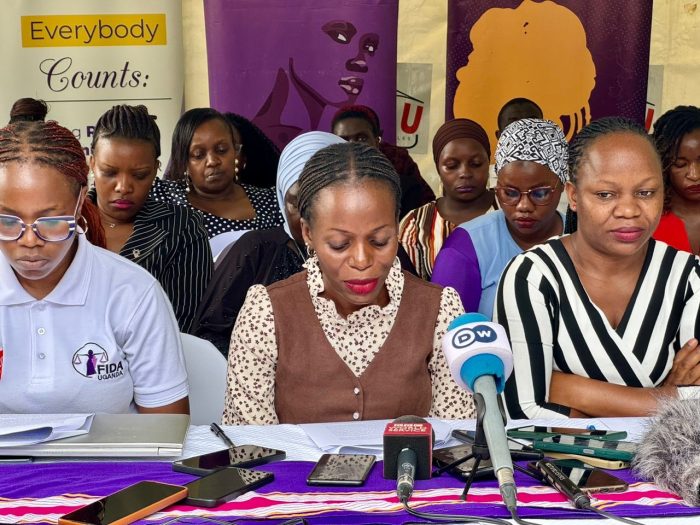
A STATEMENT BY THE WOMEN’S MOVEMENT IN UGANDA CONDEMING VIOLENCE AGAINST WOMEN AND GIRLS
Monday, 9th September 2024: The Women’s Movement of Uganda convenes today to voice its concern about the escalating incidents of Gender Based Violence (GBV) and especially Violence Against Women and Girls (VAW/G). Today we stand in solidarity with the Uganda Athletics Federation, the Ministry of Education and Sports and the sisterhood of women’s rights activists in Kenya to mourn and strongly condemn the incidences of Violence Against Women witnessed in the recent past. We mourn with the family of Rebecca Cheptegei, this profound loss that they have suffered.
We are deeply saddened and concerned by the horrendous murder of Rebecca Cheptegei, a celebrated Ugandan Olympian, who was deliberately doused in petrol and set ablaze by her boyfriend. Rebecca’s death tragically illustrates the extreme vulnerabilities women continue to face, even as they break barriers and bring pride to their communities. This brutal act of violence is not an isolated incident but rather an alarming reflection of the escalating violence against women (VAW) in Uganda and across the globe. It is a painful reminder of the growing backlash and rollback on women’s rights, as women in all sectors from sports, business, government and civil society continue to face unprecedented levels of violence and oppression. It is also an indication of the low regard with which society perceives women’s rights.
In neighbouring Kenya where Rebecca met her premature end, the sports fraternity has for years suffered a spate of violent killings of female athletes, all committed by their partners. In 2021, Agnes Jebet Tirop was stabbed and beaten to death by her husband who left a note confessing to the crime. On the same day, Edith Muthoni was shot in the head by her boyfriend after an argument. In 2022 Damaris Mutua was found strangled to death, and the prime suspect was her boyfriend. The violence has also been in other ways; in 2014, Lucy Kabuu, another runner was sued by her ex-husband for control of half of her properties. For many years now, Vivian Cheruiyot has battled with her husband’s forceful control of her properties and reported complaints of emotional and physical abusive. We hope that society realises that femicide is just the end of prolonged mistreatment; because violence is like a cancer which grows in form and in cruelty. This is why everyone must be concerned about violence in any community.
According to a 2023 survey released by the Kenya National Bureau of Statistics, 1 out of 3 women in Kenya has experienced Gender-Based Violence. The survey also found that over 40% of women in Kenya are likely to face a lifetime of physical and sexual abuse from their partner. According to Femicide Count Kenya which pulls data from local media, 152 women were killed in 2023, and these are only the reported cases.
The situation is not any different in Uganda. According to the 2023 Uganda Police Annual Crime Report, 15,184 people were survivors of Domestic Violence (DV), 10,792 of whom were female. A total of 249 persons were killed as a result of aggravated domestic violence; 95 were male and 113 were female. There has been continued maiming, sexual abuse and denial of property rights to women. The 2022 National Survey on Violence in Uganda conducted by the Uganda National Bureau of Statistics (UBOS) also found that Intimate Partner Violence (IPV), which is often a precursor to femicide was at 45%, the highest being in Acholi region at 78%. The statistics depict the persistent social norms, community apathy and low prosecution rates that continue to contribute to the prevalence of such crimes as they are recorded as Gender-Based Violence which is underrated and under-prosecuted as a seemingly lesser crime.
The statistics in both countries (Uganda and Kenya) are significant; they are alarming indicators of a regional emergency of growing backlash against women and a roll back on women’s rights. Upon the establishment of the East African Community (EAC), partner states made a commitment under Article 6(d) of the EAC Treaty to adhere to certain fundamental principles including the rule of law and accountability for social justice, gender equality, and the recognition, promotion and protection of human and people’s rights. The drive to regional integration has unfortunately not prioritized the advancement of gender justice. It is shown by the disparity in legal/regulatory frameworks and judicial jurisprudence on women’s rights and gender, divergent national strategic priorities and national attitudes to women’s rights.
Download Full Statement here….
Visit Photo Gallery
